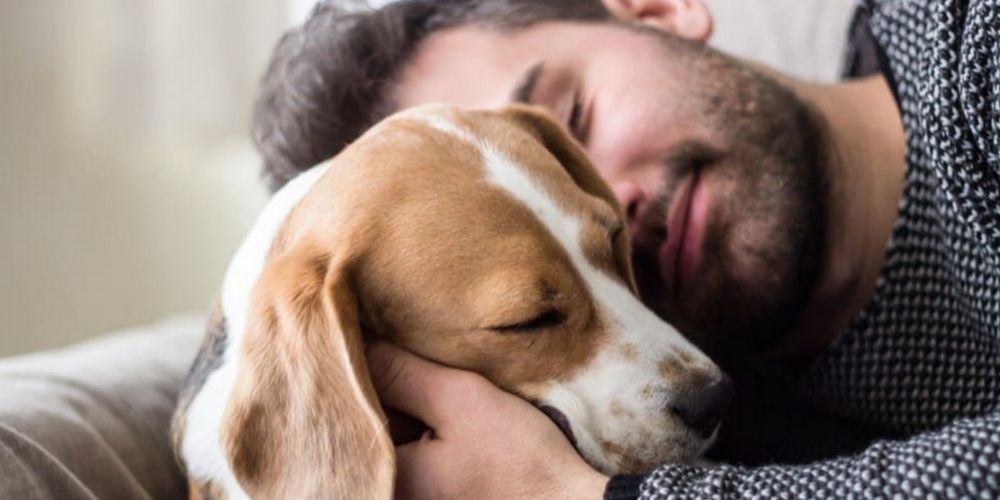
The loss of a cherished pet is a heartbreaking experience for owners. It’s usually a difficult and distressing moment whether your dog dies naturally at home or is put to sleep at the vet.
If your pet has been ill or is extremely old and reaching the end of its life, you may have already made preparations for its ultimate death. Even the best-laid plans, however, might be derailed by external forces or tragedy. In the early aftermath of your pet’s death, always seek assistance from a friend, family member, or veterinary expert.
The confusion of how to treat a pet’s remains sometimes adds to the pain of their death. This detailed advice on what to do after your dog dies can help to alleviate some of the burdens during this difficult time.
What happens when a dog dies of natural causes?
We commonly equate pet death with being put to sleep at a veterinarian clinic. But what if a dog dies naturally at home?
If your pet dies at home, dealing with their remains may be tough. You might contact your veterinarian or another professional service, such as a business that handles deceased dog disposal. Please keep in mind that certain services may not be accessible on weekends or during national holidays.
When a dog dies, its body may still exhibit indications of life, such as the following:
- Twitching, as a result of natural nerve spasms after death
- The release of air from the mouth when moved
- The release of bodily fluids and gas
All of these things might be difficult for owners to observe, particularly if they aren’t expecting them. Unfortunately, these are not signals that your pet is reviving. They are merely normal body activities that occur when a dog dies naturally.
What Should You Do If Your Dog Dies?

When handling remains, always use gloves and properly clean any location that the animal has touched, as well as any fluids that may have been spilled. It’s critical to keep germs at bay in the early aftermath.
If you want to keep your pet at home for a few hours before arranging dead dog disposal, make sure the corpse is kept in a cool place for no more than 24 hours. Rigor mortis (joint stiffness after death) will begin to develop roughly three to four hours after death.
The alternatives
Your local vet will be well-equipped to deal with dead dog disposal, and if you want them to do it, give them a call as soon as possible. Your veterinarian should subsequently be able to arrange for the collection and, if desired, burial or cremation.
Cremation of a dog
It is feasible to arrange for your dog’s cremation oneself rather than going via a vet. Dog cremation is more expensive than home burial, but it provides owners with more alternatives for memorializing their pet’s ashes.
Crematoriums will return a dog’s ashes to its owner, where they may be preserved or distributed as desired. Many owners opt to save their dog’s ashes in an urn or in remembrance items such as jewelry. Owners often disperse their pet’s ashes in areas or on walks they like.
Remember that there are several cremation alternatives, including communal or private cremation. If you want to use your pet’s ashes for a monument, bear in mind that, although crematoriums try their best to keep ashes separate during community cremations, this cannot be guaranteed.
What is the cost of cremating a dog?
The cost of dog cremation varies depending on the Crematory and the alternatives available. These selections are determined by a number of circumstances, including the size of the dog and if a communal or private cremation is requested. So, how much does a dog’s cremation cost? Overall expenditures will often exceed £100.
Burial at home
Some dog owners choose to bury their pets at home. This solution lowers the expense of deceased dog disposal by eliminating costly cremation fees and provides the last resting place for loving dogs at home. It is important to examine local rules before considering home burial. It is lawful in the United Kingdom to bury pets in your own yard. It is illegal to bury animals on the grounds of rental properties, on public land, or on private property. If you decide to bury your dog, make sure its remains are not harmful to human health and find a location away from water sources.
When burying a dog at home, ensure that their grave is no less than three feet deep, to ensure that their remains stay covered. You may also decide to commemorate the burial spot with a covering of stone or even a potted plant.
Animal cemeteries

There are a few pet cemeteries and crematoriums in the UK that will give dog burial services. This is a more costly alternative than dog cremation, with the ultimate cost determined on weight. Cemeteries may also demand that remains be buried in a coffin or other container, raising the entire expense.
Individual sites for canine burial are available at pet cemeteries, and you may even install a headstone or other memorial monument over the cemetery.
Loss of a pet
What to do when your dog dies is just the beginning of a painful journey for pet owners. For many people, the loss of a cherished pet is comparable to the death of a friend or family member, and you should always seek help if necessary.
Losing a pet is always traumatic, but there are numerous support groups and organizations to turn to during this tough time.